Literacy
Literacy at Queen's Drive Infant School
Vision- To develop confident communicators, in order to use speaking and listening, reading and writing to access and enjoy the wider curriculum with resilience to support lifelong learning.
INTENT - At Queen’s Drive Infant School we aim to deliver an effective phonics programme which builds reading and writing skills. We believe that reading is the key stepping stone to curriculum success.
In order to achieve success in literacy we teach children to:
· apply the skill of blending phonemes in order to read words.
· segment words into their constituent phonemes in order to spell words.
· learn that blending and segmenting words are reversible processes.
· read high frequency words that do not conform to regular phonic patterns.
· read texts and words that are within their phonic capabilities as early as possible.
· decode texts effortlessly so all their resources can be used to comprehend what they read.
· spell effortlessly so that all their resources can be directed towards composing their writing.
-understand the grammar required to write coherent sentences.
· develop ideas and writing styles in order to compose coherent pieces of non- fiction/fiction writing with attention to punctuation and tense.
IMPLEMENTATION:
In order to teach Literacy effectively, we have a structured approach from EYFS to the end of Year 2.
RWI Phonics and Reading 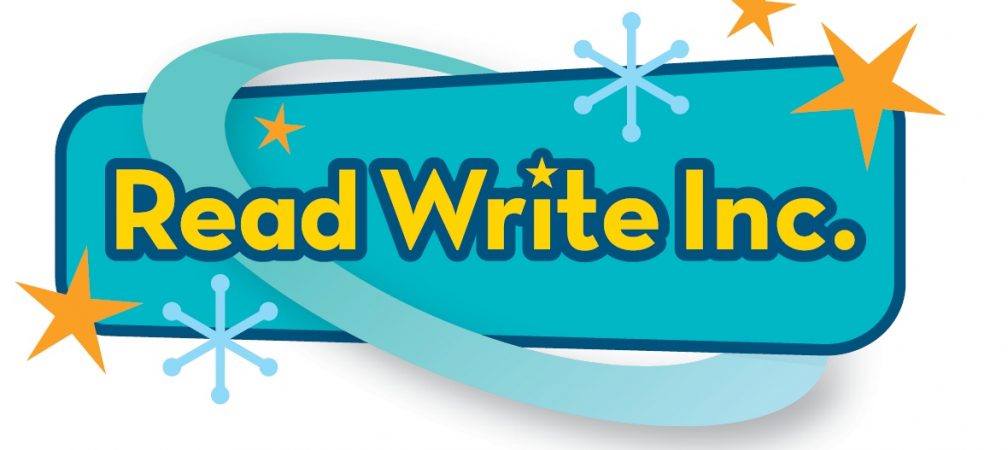
We use the Ruth Miskin ‘Read, Write Inc.’ Programme. The programme begins from the first week your child enters school in Reception and continues into Year 2.

At the start of EYFS they begin with a 10 minute phonics lesson building up to about an hour's phonics and reading within the day by the end of the year. In year 1 and 2 about an hours is allocated to phonics and reading throughout the day in the form of structured RWI phonics lesson and a whole group RWI Reading lesson. Children are placed into groups according to phonic knowledge from rigorous ongoing assessment. Our groupings are not stagnant but, children move between groups according to assessment.
RWI follows our belief that if we get the teaching of Reading right then everything else will fall into place.
Use the helpful links below to find out more.
Parent video: Why read to your child? - YouTube
Parent video: 10 things to think about when you read to your child - YouTube
Parent video: Understanding Phonics - YouTube
Parent video: What is Read Write Inc Phonics - YouTube
Parent video: How to say the sounds - YouTube
sound blending phonics video (oxfordowl.co.uk)
To find more information about how we teach RWI in our school, visit this website: https://www.ruthmiskin.com/en/
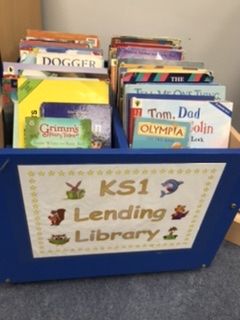 Children take Reading books home which are part of the RWI Home Book Bag Readers. These books are texts which match their reading within school. Once off the RWI programme children take books home to read using the Book bands system. To encourage a love for reading the children are also allowed to take home a book from the Lending Library every day. We have a range of fiction, non-fiction, poetry that cover a range of genres, cultures and topics.
Children take Reading books home which are part of the RWI Home Book Bag Readers. These books are texts which match their reading within school. Once off the RWI programme children take books home to read using the Book bands system. To encourage a love for reading the children are also allowed to take home a book from the Lending Library every day. We have a range of fiction, non-fiction, poetry that cover a range of genres, cultures and topics. 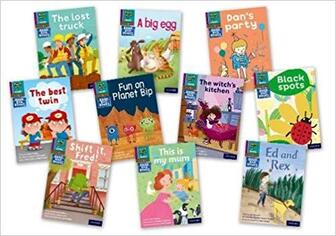

The Write Stuff (Jane Considine) - This academic year we have chosen to use The Write Stuff strategy to develop our Writing across the school. This is a structured teaching approach to support and guide children with the composition and grammar of Writing.

It is based on two guiding principles; a teaching sequence that slides between experience days and sentence lessons, with modelling at the heart of them.
The lessons are built around a high quality text. Experience days build children’s knowledge and language/vocabulary around themes within the text.
Sentence lessons are broken into bite-sized chunks and taught under a clear success criteria. At the end of a sentence lesson the teacher selects children’s own sentences that after the unit become the model/WAGOL.
Once sentence lessons are complete the children should be fully supported in language and sentence structures in order to confidently write an independent piece based around the story.
To find out more about 'The Write Stuff' or to watch some online lessons Jane herself made during lock down subscribe to the YouTube chanel below.
Jane Considine Education - YouTube
In order to help your child, in Jane's own words,“Make sure your child gets eight hours’ sleep a night,” she says. “Read to and with your child. Enjoy your child being a reader. Foster a love of reading through your own relationship with books and words.” (The Guardian, UK Edition)
Look at our long term planning for the texts each year group will be accessing through The Write Stuff over the year.
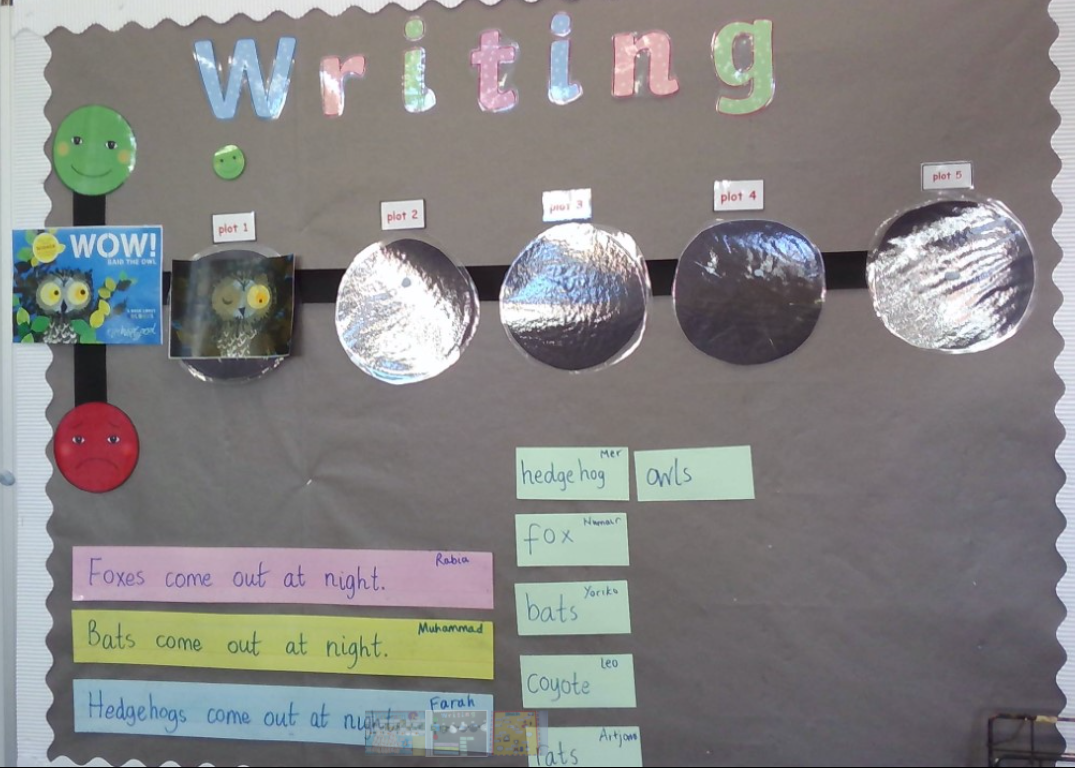 EYFS Working Wall
EYFS Working Wall
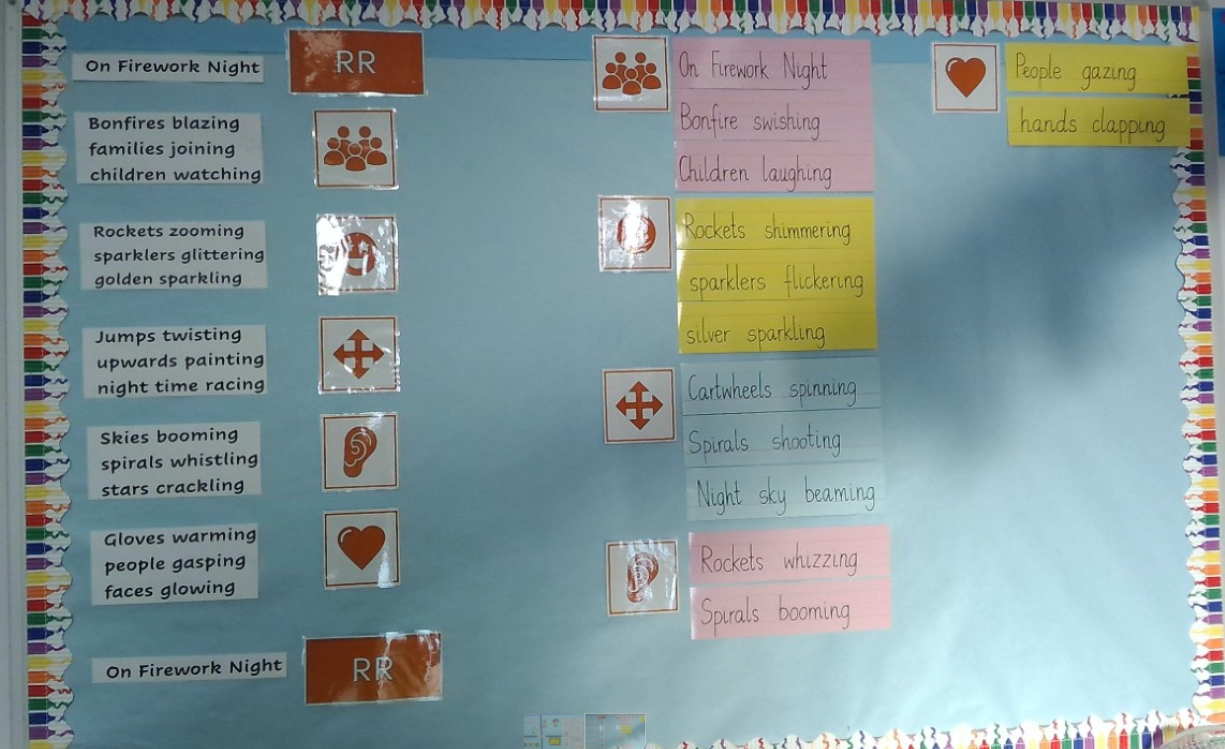 Year One
Year One
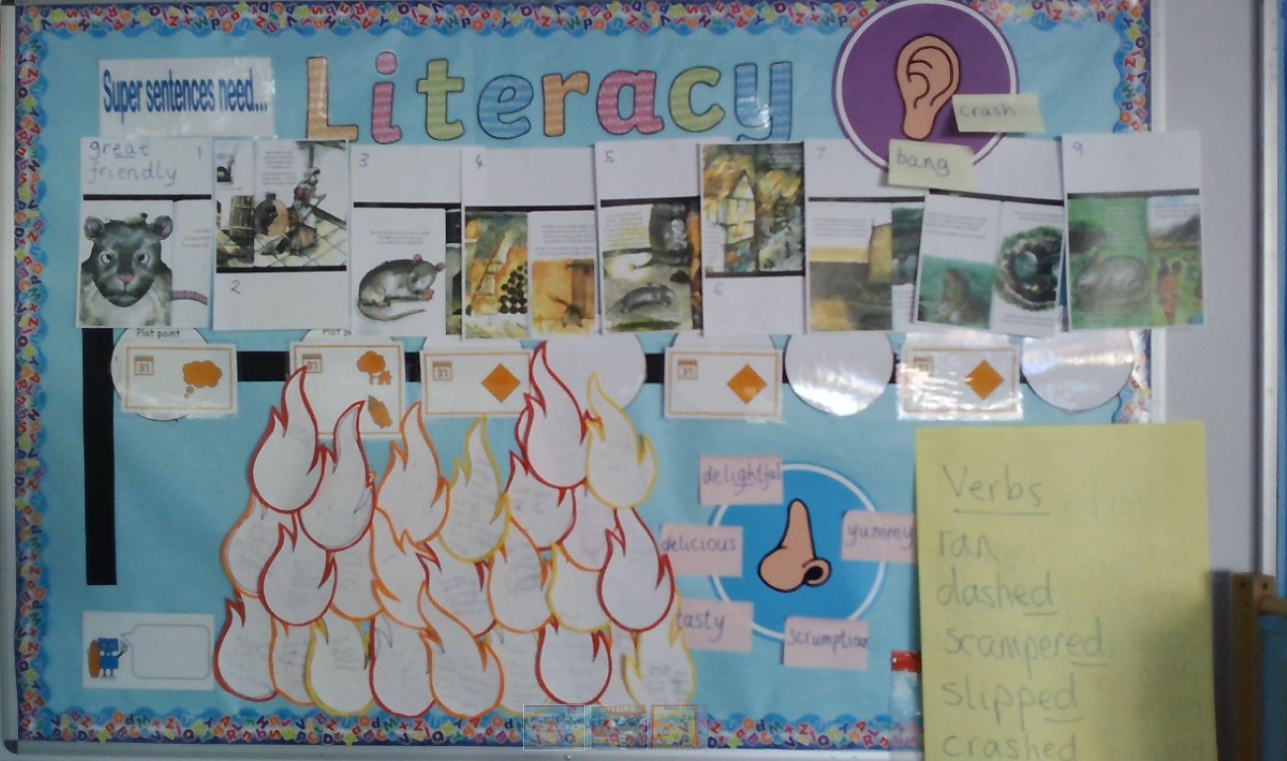
Year 2 working wall 'The Write Stuff'
RWI Spelling Programme - Once children have completed the RWI phonics programme we move them onto the spelling programme. This covers all spelling patterns that children are required to use and apply by the end of year 2.
Reading for Pleasure - Every year we host an Author week in school. This is where we invite famous authors or illustrators into our school to work alongside the children. We have the pleasure of meeting authors such as Michael de Souza, Gary Parsons, Nadia Shireen and Ellie Sandall. Every classroom has a Reading Corner designed around a book, author or a theme. The reading corners are exciting and inviting. Teachers rotate books to expand reading and introduce new texts to the children. We are also developing 50 key texts for each year group to have access to. These will be read during Story times and available for children to read to each other or own their own.
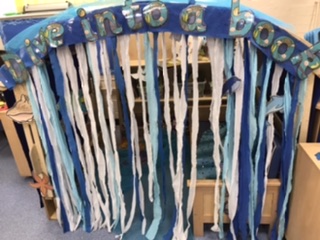
Story Times -Story Time is regarded as an essential part of the timetable. Books are pre-selected in order to insure teachers can address vocabulary and topics with the children. We encourage stories to be re read to develop an understanding of structure, story features and repetition.
Reading across the Curriculum - Subject Leaders plan in the effective use of story and non fiction texts when delivering topics. Stories can be used as starting points to introduce topics or to expand knowledge and understanding. You can see some selected texts on the foundation subject web pages. EYFS plan each of their units of work around a book.
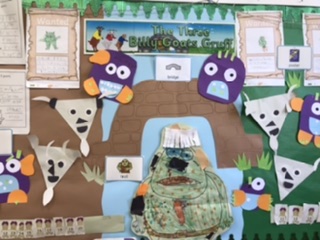
We endeavour that through our teaching of phonics and reading the children will develop key skills in becoming fluent readers and have a love for reading new and unknown texts alongside well known stories. We hope they will be able to use non fiction texts to find new and exciting information that will amaze them.
These skills will then help with their speaking and writing. They will be able to understand and write many different genres from travelling tales, adventure stories, lost and found tales, disaster tales, wishing tales to instruction writing, letters, postcards, non-chronological reports, experiments and recounts.
Look at our Long Term Planning in order to see the High Quality Core texts the children will be accessing across each year group.
Speaking and Listening - At Queen’s Drive we see the importance of developing language in our pupils. This is done through Literacy/ RWI lessons and also through other subject areas. The teachers use the initiative 'Word Aware' in order to provide a structure to teach common vocabulary that the children will use again later in life. (See Word aware web page) Teachers have speaking and listening activities at the heart of their learning. This beginning in EYFS and is continued into Key stage 1. They use many techniques in order to engage pupils in speaking and listening. For example:-
· Role play, Talk partners, poetry reciting, Hot seating, Group Discussion, Circle time, Building sentences, Word aware, Language Link in EYFS and Year 1
Poetry - The children are taught to explore poetry from EYFS to year 2. Within EYFS and Year 1 they use a range of poems including the RWI poetry Time in order to develop reciting skills. In year 2 the children learn to recite poems by a range of poets that are connected to the topics they are learning. Time is spent performing poems to their peers across the school.
Parental Engagement : We take pride in involving parents as much as we can in children’s education.
*Daily Home reading is encouraged using books at the child’s correct reading level.
*Children will have access at home to 'OXFORD READING BUDDY' online learning or 'RWI EBOOKS' See the link below explaining a little more about this online service.
*workshops for parents alongside their child in order to understand strategies used in school. In the event parents can not attend school, videos of instruction are uploaded onto Seesaw.
*Children can also access online reading through Oxford Owl Reading Buddy and PurpleMash.
*Parents are invited to story cafes in school each term to join in with a story time and then take part in a range of activities that can be created from the book. These are very successful sessions and both parents and children enjoy taking part. (Visit the Story cafe page for more information).
*At the end of the term the children present a SHOWCASE to parents. Children can demonstrate what they have learnt over the term and help children with their communication and presenting skills.
IMPACT - The Impact from our strategies are evaluated at the end of each term. However, teacher ongoing assessment in phonics, reading and writing informs children's personal targets, next steps and achievements.
Where necessary 1 to 1 or small group tutoring may be necessary in order to quickly address a gap or misunderstanding in learning.
